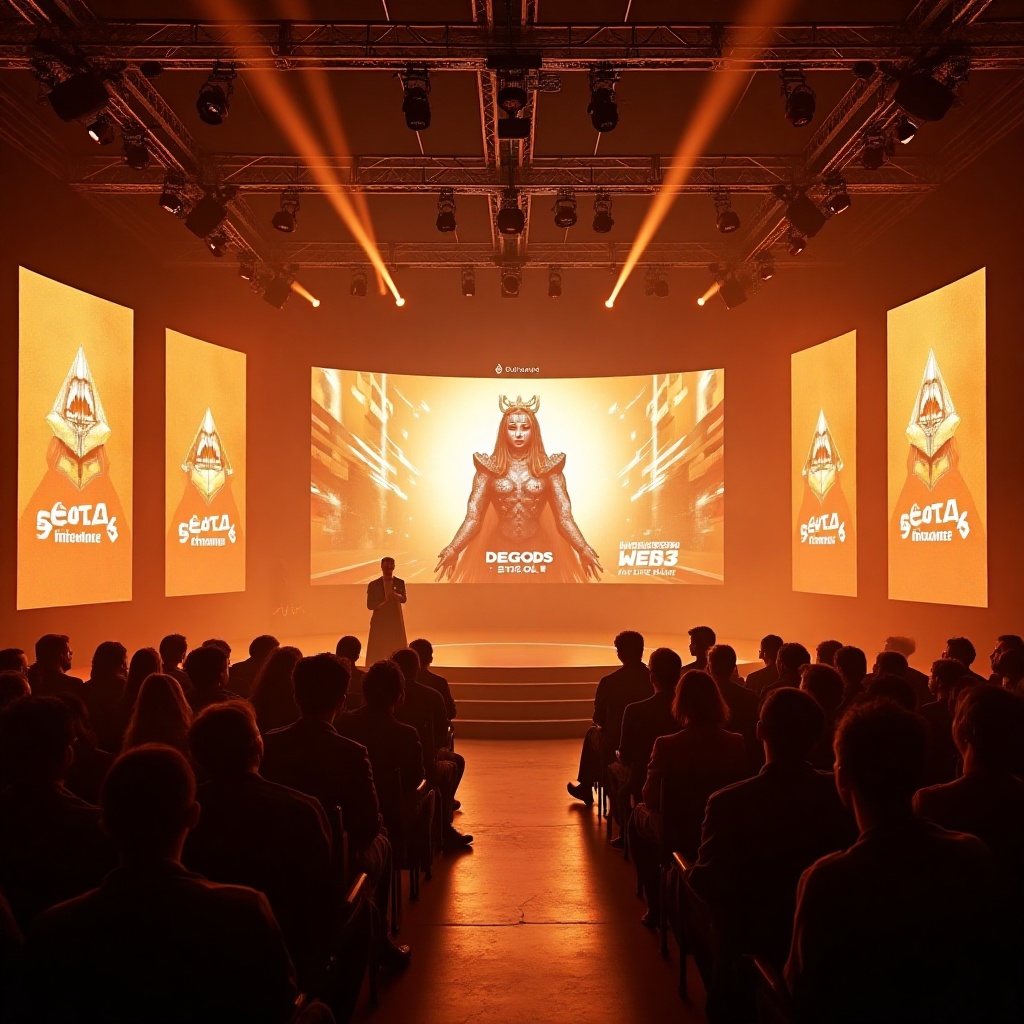In the ever-evolving landscape of NFTs, few projects have captured the imagination and scrutiny of the community like DeGods. Launched in October 2021 by Rohun “Frank” Vora and the DeLabs team, DeGods quickly ascended to prominence on the Solana blockchain, distinguishing itself through innovative mechanics and a vibrant community. The project’s early adoption of the “Paper Hands Bitch Tax” (PHBT)—a 33.3% fee imposed on sales below the floor price—was a bold experiment aimed at discouraging quick flips and fostering long-term holding.
This unconventional approach, coupled with the project’s unique aesthetic blending modern streetwear with ancient deity-inspired art, propelled DeGods to become one of the most valuable NFT collections on Solana. The community’s enthusiasm was palpable, with holders proudly displaying the “(33.3%)” tag in their usernames, symbolizing their commitment to the project’s ethos.
However, the journey has not been without its challenges. The initial mint faced technical issues, leading to accusations of a “rug pull” and a subsequent crash in floor price. The team responded with transparency and a commitment to improvement, introducing the $DUST utility token and the DeadGods upgrade, which allowed holders to enhance their NFTs without inflating the collection’s supply.
In April 2023, DeGods made a significant move by migrating from Solana to Ethereum, seeking new opportunities and a broader audience. This transition marked a new chapter for the project, as it aimed to solidify its status as a blue-chip NFT collection in the broader Ethereum ecosystem.
The anticipation for DeGods Season 3 was immense, with the community eager to see how Frank and the team would innovate and rekindle momentum. The release introduced new artistic directions and gamified experiences, sparking both excitement and controversy. As we delve into the genesis of DeGods, we’ll explore how its origins set the stage for its current trajectory and the challenges it faces in maintaining its esteemed position in the NFT space.
The Genesis of DeGods
In the dynamic world of NFTs, few projects have experienced a journey as tumultuous and transformative as DeGods. Launched on October 8, 2021, by the pseudonymous founder Frank (later revealed as Rohun Vora), DeGods debuted on the Solana blockchain with a collection of 10,000 unique NFTs, each minted at a price of 3 SOL. Despite technical challenges that marred the initial minting process, the collection sold out in a mere seven seconds, signaling strong market interest.
In an innovative move to discourage quick flips and stabilize the floor price, DeGods introduced the “Paper Hand Bitch Tax” (PHBT). This mechanism imposed a 33.3% tax on any sale below the floor price, with the collected fees directed to the DeGods treasury. The PHBT quickly became a cultural phenomenon within the community, with holders proudly adding “33.3%” to their usernames as a badge of honor.
However, the PHBT experiment faced practical challenges. While it succeeded in fostering a strong community identity, it also created barriers to liquidity and deterred potential buyers. Recognizing these issues, the DeGods team discontinued the PHBT on January 1, 2022, replacing it with a standard 9.99% royalty fee on all sales.
In December 2022, DeGods announced a significant shift: the migration of the project from Solana to Ethereum. Frank cited the need for broader exposure and growth opportunities as the primary reasons for this move. The transition was completed in early 2023, marking a new chapter in DeGods’ evolution.
This migration not only expanded DeGods’ reach but also introduced new dynamics to its ecosystem, including the integration of the $DUST utility token and the launch of the DeadGods upgrade. These developments, along with the project’s innovative approaches and strong community engagement, have solidified DeGods’ position as a prominent player in the NFT space.
Transition to Ethereum and the Prelude to Season 3
In late 2022, DeGods made a pivotal decision to migrate from the Solana blockchain to Ethereum. This move was driven by a combination of factors, including the desire to tap into Ethereum’s larger NFT market and to distance the project from the challenges facing Solana at the time. The migration was completed in early 2023, marking a significant shift in DeGods’ trajectory.
The transition to Ethereum was not without its complexities. Bridging NFTs between blockchains is a technically challenging process, and the DeGods team had to ensure that the migration was secure and seamless for holders. Despite these challenges, the move was executed successfully, allowing DeGods to establish a presence in the Ethereum ecosystem.
As DeGods settled into its new home on Ethereum, anticipation began to build for the next phase of the project: Season 3. The community was eager to see how the team would leverage the capabilities of Ethereum to introduce new features and innovations. Teasers and announcements hinted at significant updates, including a novel approach to NFT art and the introduction of a gamified rewards system.
Unveiling Season 3: Innovations and Controversies
DeGods Season 3, launched on August 13, 2023, marked a significant shift in the project’s trajectory, introducing bold innovations that both intrigued and polarized the NFT community.
Departing from the conventional trend of enhancing visual complexity, DeGods introduced an “Art Downgrade,” embracing a minimalist, pop-art-inspired aesthetic. Drawing inspiration from 1960s pop art icons like Roy Lichtenstein and classic American comic book illustrators, the new design featured simplified, flat 2D visuals with reduced color palettes and minimal shading. This transformation was not merely cosmetic; it was a strategic move to make the artwork more accessible and engaging. Holders could opt into this new style by paying 333 $DUST per NFT, with the fee set to decrease over time to encourage broader participation.
Complementing the visual overhaul, DeGods introduced Points Parlor, a gamified rewards system designed to enhance community interaction. Developed by Dust Labs, this platform allowed holders to earn loyalty points through staking their NFTs, which could then be used to win prizes. The prize pool was substantial, comprising all $DUST fees collected from the Season 3 upgrades and over $250,000 in brand-sponsored rewards.
Points Parlor also served as an innovative advertising model, connecting brands directly with the DeGods community. By sponsoring prizes, brands gained visibility among a highly engaged audience, while holders benefited from tangible rewards, creating a mutually beneficial ecosystem.
In an effort to promote inclusivity, DeGods planned to introduce Female DeGods, allowing holders to swap their male avatars for female versions. However, following community feedback expressing concerns about the implementation and representation, the launch was postponed. The team committed to gathering more input from female community members to ensure a thoughtful and respectful rollout in the future.
The ambitious changes in Season 3 elicited a spectrum of reactions. While some praised the innovative approach and refreshed aesthetics, others expressed dissatisfaction with the art style and the cost associated with the upgrade. Notably, the floor price of DeGods NFTs experienced volatility, with a significant drop following the launch, attributed in part to large holders liquidating their assets.
Acknowledging the community’s concerns, founder Frank DeGods publicly addressed the feedback, expressing regret over the missteps and reaffirming the team’s commitment to adjusting their approach based on community input.
DeGods Season 3 represents a bold experiment in redefining NFT engagement, blending artistic innovation with gamified community interaction. While the rollout faced challenges, it underscored the project’s willingness to adapt and evolve in response to its community’s needs and preferences.
Market Response and Trading Activity
The launch of DeGods Season 3 was met with a whirlwind of market activity, reflecting both the project’s strong community engagement and the volatile nature of the NFT space.
In the days leading up to and following the Season 3 announcement, DeGods experienced a significant uptick in trading volume. The project saw a $2.8 million boost in trading volume, indicating heightened interest and activity within the community. This surge was further amplified by the migration of DeGods’ sister project, y00ts, to Ethereum, which contributed to a 530% increase in DeGods’ trading volume, reaching $16.1 million in a single week.
Despite the initial excitement, the market response to Season 3’s new features and art style was mixed. Within just over a week of the launch, DeGods’ floor price fell by 50%, a significant drop that highlighted the community’s divided opinion on the project’s new direction. This decline was attributed to several factors, including dissatisfaction with the new art style, concerns over the project’s leadership, and broader market conditions affecting the NFT space.
The community’s reaction to Season 3 was polarized. While some praised the project’s innovative approach and willingness to experiment, others expressed disappointment with the changes, particularly the “art downgrade” and the Points Parlor gamification. This division within the community underscored the challenges DeGods faced in balancing innovation with the expectations of its existing user base.
The volatility in DeGods’ market performance occurred against a backdrop of a generally declining NFT market. Top PFP projects, including DeGods and Yuga Labs’ collections, encountered setbacks, with floor prices affected by both internal project developments and external market pressures.
This broader context suggests that while DeGods’ Season 3 launch had specific challenges, its market performance was also influenced by wider trends in the NFT ecosystem.
Leadership Changes and Strategic Shifts
On August 14, 2023, Rohun Vora, known in the NFT community as “Frank DeGods,” announced his resignation from the DeGods project. This decision came shortly after the debut of Season 3, which introduced the controversial “Art Downgrade” and the Points Parlor gamification system. Frank’s departure was unexpected and stirred discussions within the community about the project’s direction and leadership.
Following Frank’s resignation, leadership transitioned to new figures within the DeGods ecosystem. While specific details about the new leadership team were not extensively publicized, the project’s continuity was maintained through the efforts of the remaining team members and the broader community. The new leadership faced the challenge of addressing community feedback, managing the aftermath of Season 3’s mixed reception, and steering the project towards renewed growth and stability.
The strategic shifts undertaken by the new leadership included re-evaluating the Points Parlor system and considering adjustments to the project’s artistic direction. These changes aimed to realign the project’s offerings with community expectations and market demands.
As DeGods navigated this transitional period, the focus remained on fostering community engagement, enhancing the project’s value proposition, and exploring innovative approaches to maintain its relevance in the evolving NFT landscape.
Evaluating the Future of DeGods
DeGods has experienced a dynamic journey since its inception, marked by innovative strides and significant challenges. As the project stands at a crossroads, assessing its future involves a nuanced understanding of its strengths, the hurdles it faces, and the potential pathways forward.
Robust Community Engagement
One of DeGods’ most significant assets is its vibrant and dedicated community. From the early days of the “Paper Hands Bitch Tax” to the enthusiastic participation in various project initiatives, the community has consistently demonstrated a strong commitment to the project’s vision. This level of engagement provides a solid foundation for future developments and adaptations.
Innovative Approach to NFT Utility
DeGods has consistently pushed the boundaries of NFT utility. The introduction of the $DUST token, the DeadGods upgrade, and the Points Parlor system exemplify the project’s commitment to enhancing the value proposition for holders. These innovations have set DeGods apart in a crowded NFT landscape and offer a framework for future utility-based developments.
Strategic Leadership Transition
The recent leadership transition, with Frank stepping down and new figures taking the helm, presents an opportunity for fresh perspectives and strategies. This change can catalyze a renewed focus on community feedback, project transparency, and sustainable growth, aligning the project’s direction with the evolving expectations of the NFT space.
Challenges and Market Volatility
The NFT market is inherently volatile, and DeGods is not immune to these fluctuations. The significant drop in floor price following Season 3’s launch underscores the sensitivity of the market to project developments and community sentiment. Navigating this volatility requires careful planning and responsive strategies to maintain holder confidence.
Balancing Innovation with Community Expectations
While innovation is a hallmark of DeGods, aligning new initiatives with community expectations remains a delicate balance. The mixed reactions to the “Art Downgrade” and Points Parlor highlight the importance of incorporating community feedback into the development process to ensure that innovations resonate with the project’s core supporters.
Competitive NFT Landscape
The NFT space is rapidly evolving, with numerous projects vying for attention and investment. Maintaining relevance and distinguishing DeGods in this competitive environment necessitates continuous innovation, effective marketing, and a clear articulation of the project’s unique value proposition.
Potential for Reclaiming Blue-Chip Status
Reestablishing DeGods as a blue-chip NFT project is an ambitious yet attainable goal. Achieving this status will depend on several critical factors including responsive leadership, strategic innovation, and effective market positioning. By leveraging its strengths, addressing its challenges head-on, and executing a clear, community-aligned strategy, DeGods has the potential to not only reclaim but also solidify its position as a leading project in the NFT space.
Can DeGods Regain Its Blue-Chip Glory?
DeGods’ journey through Season 3 has been a testament to the volatile and rapidly evolving nature of the NFT landscape. The project’s ambitious innovations, including the “Art Downgrade” and the Points Parlor gamification, showcased a willingness to experiment and redefine community engagement. However, these bold moves also highlighted the challenges of aligning novel concepts with community expectations and market dynamics.
The initial surge in trading volume and heightened attention underscored the community’s enthusiasm and the project’s potential. Yet, the subsequent decline in floor price and mixed reactions to the new features revealed the delicate balance between innovation and user satisfaction. The leadership transition, with Frank stepping down, marked a significant turning point, emphasizing the importance of adaptive governance and responsive strategy in the NFT space.
Looking ahead, DeGods’ ability to reclaim and sustain its blue-chip status will hinge on several critical factors: prioritizing transparent communication, strategic innovation aligned with market realities, and staying agile in response to trends. The project’s future success will depend on its capacity to learn from past experiences, engage its community meaningfully, and innovate thoughtfully within the dynamic world of NFTs.





